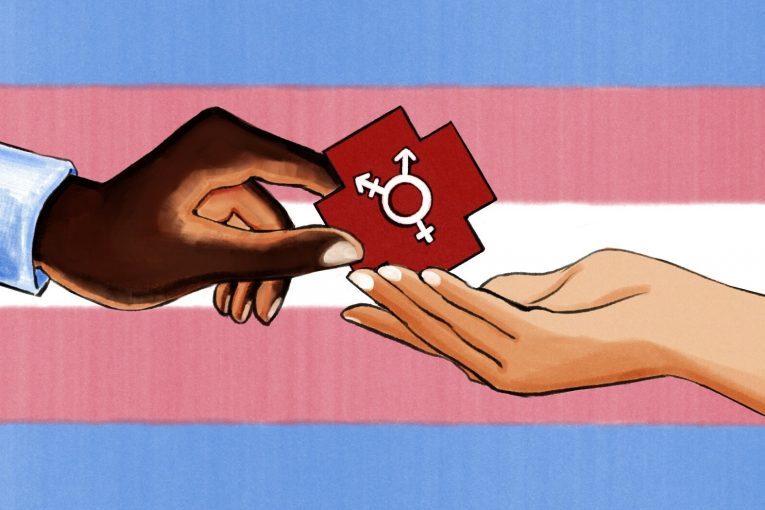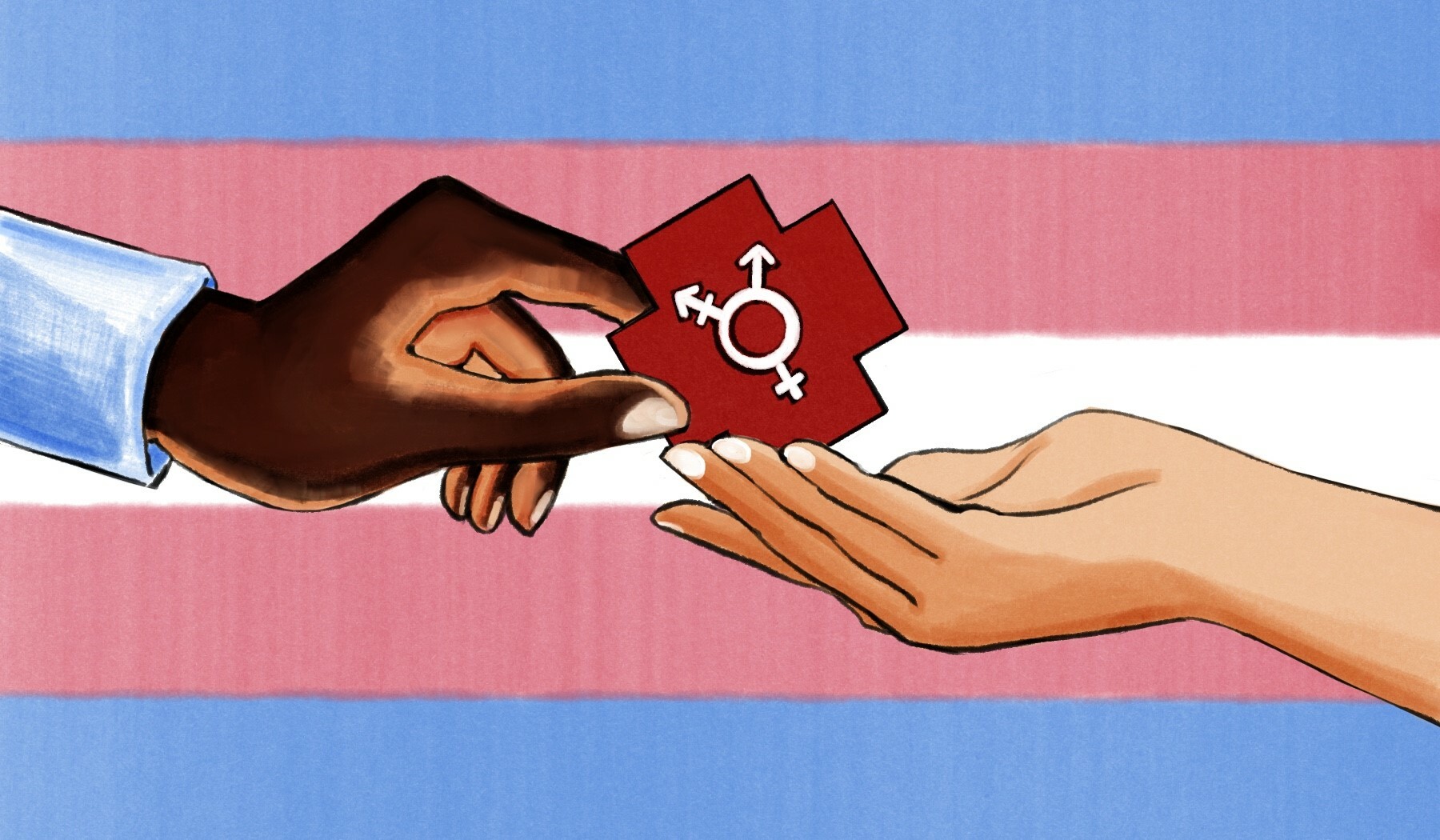

Transgender people who have experienced prison call for more humane conditions and treatment.
Nearly one in six transgender people report experiencing jail or prison at some point during their lives. For Black transgender people, the rate is nearly one in two. Once incarcerated, transgender people often experience assault and face isolation or solitary confinement. Too often, their voices go unheard.
This essay was originally published by the Vera Institute of Justice. The Vera Institute of Justice interviewed five transgender people who survived incarceration and asked them to share their stories. We have broken this out into five parts.
Part Five: Sandra (she/her/hers)
I knew I was transgender at the age of eight. Growing up, I was feminine; I played with dollies. I was not like any of the other boys. I could never be the son my dad wanted, being a Marine. I could never be his son with an M16 strapped to his back.
I was in federal prison for 18 years. It was very, very difficult for me. I was raped several times throughout my incarceration. I only reported one rape because I was beat  up completely. I was locked inside a cell. What could I do? I couldn’t flush myself down the steel toilet. The man was beating on me and throwing me around the cell. I had to be taken to the emergency room where they did a rape kit. After I went back to the prison, they put me into segregation lock up. I had to go through an invasive strip search, and I kept having flashes of the assault. I remember crying and the officer saying, “Toughen up. How can you claim to be raped, this is what you do, you go with men.”
up completely. I was locked inside a cell. What could I do? I couldn’t flush myself down the steel toilet. The man was beating on me and throwing me around the cell. I had to be taken to the emergency room where they did a rape kit. After I went back to the prison, they put me into segregation lock up. I had to go through an invasive strip search, and I kept having flashes of the assault. I remember crying and the officer saying, “Toughen up. How can you claim to be raped, this is what you do, you go with men.”
I was the victim of a brutal sexual assault and there was no sympathy whatsoever. You are not a person in there, not even a name, just a number. I was placed inside a holding cell by myself with a bare metal bed. It was freezing cold with no cover, no nothing. There was a sink and toilet connected as one. The air conditioning is on to cause you to be uncomfortable. They keep it very, very cold. I waited in the freezing holding cell for three to four hours. Finally, they got a cell ready and brought me to the door of the gate and asked me to put place my hands though the food slot so they could cuff me. Then they told me to kneel down with my back facing them so they could put shackles on. It’s a 10-minute walk from one side of the prison to the other, to segregation.
They locked me in solitary confinement for “protection.” The way to get rid of the “problem” was to leave me locked in a cell for 23 hours a day. You have a room with a steel bed with a mattress and a steel toilet-sink combination and a little food table connected to the wall. You have a window you can’t see out of, and you don’t get natural light. You are left in your cell with a light that is always on.
They do come around with a book cart. And when you come out of your cell, for one hour a day, you can ask the officers for writing paper and make a phone call and shower. That is your day. Basically, you would pray every day that God, or whatever power, would help you get through. You could easily go crazy. You basically have to learn to entertain yourself. For the first three weeks, I was scared to come out of my cell. I did a lot of sleeping. I would have nightmares reliving the assault. I would experience flashbacks and it was like being assaulted all over again. I used to feel like I could smell the body odor of the person. I used to wake up with sweats because I swore up and down that he was there. But there was no evidence of that—it was just my emotional state of mind. I didn’t know this until I got into therapy. I was able to see that it was not my fault. I was not wrong, and I was not a bad person.
I spent 10 years in solitary confinement. I went through major depression and suffered PTSD. Prison systems are not formed to provide medical or health care for people. They are not trained to deal with a problem; instead, they sweep them under the carpet, or lock them away. They don’t have a staff member that is an actual psychiatrist. They never had a persistent form of behavioral health counseling for inmates who were traumatized. I wholeheartedly believe that staff should be better trained to deal with LGBTQ+ people. They need to have more understanding for what it is for a person to be raped.
While I was in protective custody, I could go to the legal library and ask for pencils, stationery, paper, stamps, and envelopes. I just started writing to attorneys and asking if they would help me. One lawyer took my case, and she was a tiger. She respected me, she accepted who I was, she accepted that I was female, and she also understood that I was a person who needed to have my rights respected and to be protected, just like any other person. She fought wholeheartedly with everything she had, and she went up against a male committee of judges and prosecutors and she beat their asses.
It was a long fight, but I won. My assailant can’t hurt somebody again; they are not going to house him with anyone who is vulnerable. I don’t feel that I am a rat or a snitch. I am a survivor who has rights and stood up for those rights. If I cry, they are tears of strength. By suing, I opened up a lot of doors for laws to be changed in federal prison. It was very, very empowering because I had made a difference.
Because of the lawsuit, they made changes. They had to give me my hormones, acknowledge that I am female, and call me by my name. I had a diagnosis, and everything was as it should be. I was able to get hormone therapy and be treated better, thanks to the lawsuit.
Unfortunately, I had to go through a very bad ordeal, but the only way to change that is for people like me to come forward and speak. We want to be beautiful, vibrant women, and have the same acknowledgement as women. We must say that it is wrong for prisons to allow people like us to be hurt. Just because people have committed a crime doesn’t mean they don’t deserve dignity and respect. Our prison system is not formed to make people better, it is designed to punish.
I would like to see there be more sensitivity training. I would like to see where they actually have a better screening process for LGBTQ+ people to see that their needs are met. Women in male prisons need to be identified as women, and they need to be protected.
In 2016, I got released. The officer said, “You’ll be back.” I turned around and looked at him and I said, “No, I won’t be back. You will be in prison before I will be.”
